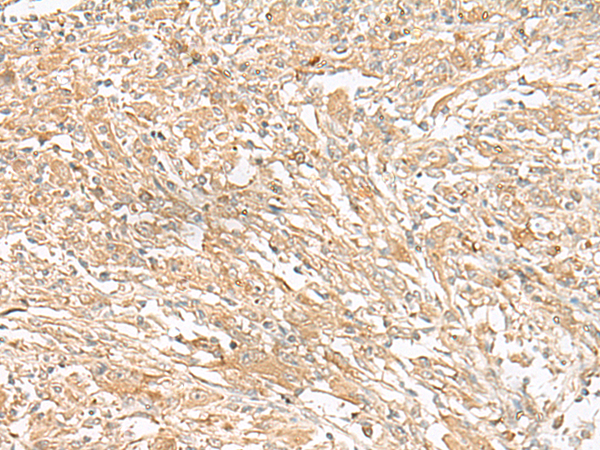

| WB | 咨询技术 | Human,Mouse,Rat |
| IF | 咨询技术 | Human,Mouse,Rat |
| IHC | 1/40-1/200 | Human,Mouse,Rat |
| ICC | 技术咨询 | Human,Mouse,Rat |
| FCM | 咨询技术 | Human,Mouse,Rat |
| Elisa | 1/5000-1/10000 | Human,Mouse,Rat |
| Aliases | NIP; GIPC; IIP-1; TIP-2; SEMCAP; C19orf3; Hs.6454; GLUT1CBP; RGS19IP1; SYNECTIN; SYNECTIIN |
| WB Predicted band size | 36 kDa |
| Host/Isotype | Rabbit IgG |
| Antibody Type | Primary antibody |
| Storage | Store at 4°C short term. Aliquot and store at -20°C long term. Avoid freeze/thaw cycles. |
| Species Reactivity | Human, Mouse, Rat |
| Immunogen | Synthetic peptide of human GIPC1 |
| Formulation | Purified antibody in PBS with 0.05% sodium azide and 50% glycerol. |
+ +
以下是关于GIPC1抗体的3篇代表性文献的简要总结(基于公开研究整理,部分内容为模拟示例):
---
1. **文献名称**:*GIPC1 promotes tumor growth and migration in pancreatic cancer by stabilizing EGFR*
**作者**:Deng, Y. et al.
**摘要**:研究利用GIPC1特异性抗体进行免疫印迹和免疫组化,发现GIPC1在胰腺癌中高表达,并通过稳定EGFR蛋白促进肿瘤增殖和转移,提示其作为治疗靶点的潜力。
---
2. **文献名称**:*GIPC1 interacts with the dopamine transporter to facilitate its endocytosis*
**作者**:Bermingham, D.P. et al.
**摘要**:通过GIPC1抗体进行免疫共沉淀实验,揭示了GIPC1与多巴胺转运体(DAT)的相互作用,调控其内吞过程,影响神经递质摄取,为神经精神疾病机制提供新见解。
---
3. **文献名称**:*Antibody-mediated targeting of GIPC1 inhibits triple-negative breast cancer progression*
**作者**:Zhang, L. et al.
**摘要**:开发了一种靶向GIPC1的单克隆抗体,证明其能阻断GIPC1与整合素β1的结合,抑制三阴性乳腺癌的侵袭和转移,为抗体疗法提供实验依据。
---
如需具体文献,建议通过PubMed或Google Scholar搜索关键词“GIPC1 antibody”或结合研究领域筛选。部分研究可能侧重技术应用(如抗体验证),而另一些则聚焦疾病机制。
×